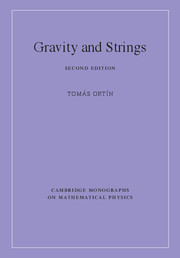Book contents
- Frontmatter
- Dedication
- Contents
- Preface to the second edition
- Preface to the first edition
- Part I Introduction to gravity and supergravity
- Part II Gravitating Point-Particles
- Part III Gravitating extended objects of string theory
- 20 String Theory
- 21 The String Effective Action And T Duality
- 22 From Eleven To Four Dimensions
- 23 The type-IIB superstring and type-II T duality
- 24 Extended objects
- 25 The extended objects of string theory
- 26 String black holes in four and five dimensions
- 27 The FGK formalism for (single, static) black holes and branes
- Appendix A Lie groups, symmetric spaces, and Yang–Mills fields
- Appendix B The irreducible, non-symmetric Riemannian spaces of special holonomy
- Appendix C Miscellanea on the symplectic group
- Appendix D Gamma matrices and spinors
- Appendix E Kähler geometry
- Appendix F Special Kähler geometry
- Appendix G Quaternionic-Kähler geometry
- Appendix H Real special geometry
- Appendix I The generic scalar manifolds of N ≥ 2, d = 4 SUEGRAs
- Appendix J Gauging isometries of non-linear σ-models
- Appendix K n-spheres
- Appendix L Palatini's identity
- Appendix M Conformal rescalings
- Appendix N Connections and curvature components
- Appendix O The harmonic operator on ℝ3 × S1
- References
- Index
27 - The FGK formalism for (single, static) black holes and branes
from Part III - Gravitating extended objects of string theory
Published online by Cambridge University Press: 05 April 2015
- Frontmatter
- Dedication
- Contents
- Preface to the second edition
- Preface to the first edition
- Part I Introduction to gravity and supergravity
- Part II Gravitating Point-Particles
- Part III Gravitating extended objects of string theory
- 20 String Theory
- 21 The String Effective Action And T Duality
- 22 From Eleven To Four Dimensions
- 23 The type-IIB superstring and type-II T duality
- 24 Extended objects
- 25 The extended objects of string theory
- 26 String black holes in four and five dimensions
- 27 The FGK formalism for (single, static) black holes and branes
- Appendix A Lie groups, symmetric spaces, and Yang–Mills fields
- Appendix B The irreducible, non-symmetric Riemannian spaces of special holonomy
- Appendix C Miscellanea on the symplectic group
- Appendix D Gamma matrices and spinors
- Appendix E Kähler geometry
- Appendix F Special Kähler geometry
- Appendix G Quaternionic-Kähler geometry
- Appendix H Real special geometry
- Appendix I The generic scalar manifolds of N ≥ 2, d = 4 SUEGRAs
- Appendix J Gauging isometries of non-linear σ-models
- Appendix K n-spheres
- Appendix L Palatini's identity
- Appendix M Conformal rescalings
- Appendix N Connections and curvature components
- Appendix O The harmonic operator on ℝ3 × S1
- References
- Index
Summary
In the previous chapters of this book we have reviewed several methods to construct BH and black-p-brane solutions of supergravity or supergravity-like theories, some of which are related to superstring theory. In Chapter 19 we showed how the results of the general classification of supersymmetric solutions in Chapter 18 can be used to construct systematically all the supersymmetric black-hole solutions (SBHSs) of some general families of four- and five-dimensional supergravity theories. However, SBHSs (and supersymmetric black-p-brane solutions (SBBSs)) occupy a very small region in the space of all BH and black-brane solutions or even in the smaller space of extremal solutions because, as we are going to study in this chapter, generically there are many more extremal non-supersymmetric than supersymmetric solutions in a given theory. On top of this, it is expected that all the extremal solutions arise as limits of some non-extremal (and, therefore, necessarily non-supersymmetric) family of solutions. The techniques we have developed to construct SBHSs and SBBSs within the framework of solutions with unbroken supersymmetry only allow us to explore certain corners of the space of BH and black-brane solutions, the most interesting of which are in the interior.
It is, therefore, highly desirable to find another framework in which non-supersymmetric (extremal and non-extremal) solutions can be studied. In this chapter we are going to review one such framework: the so-called FGK formalism, which was proposed by Ferrara, Gibbons, and Kallosh in Ref. [522] for four-dimensional asymptotically flat, single, static, extremal and non-extremal BHs and has been generalized to BHs in higher dimensions [941] and to black p-branes in arbitrary number of dimensions [56].
The FGK formalism will allow us to derive a number of general results that apply to all the black solutions of a large number of theories (those with actions of the generic form Eq. (2.147) in d = 4 or Eqs. (2.178) and (2.184) in other dimensions). In particular, we will prove the general existence of the attractor mechanism [531, 1157, 526, 527] in the extremal solutions, supersymmetric or not.
- Type
- Chapter
- Information
- Gravity and Strings , pp. 798 - 829Publisher: Cambridge University PressPrint publication year: 2015



